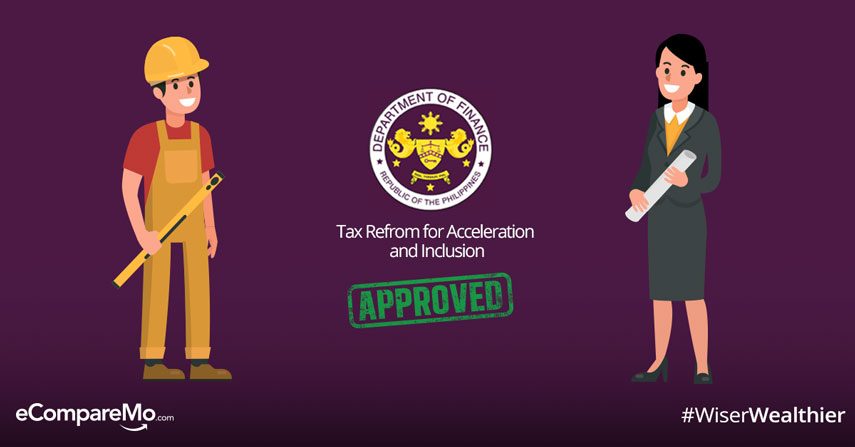President Duterte Signs The TRAIN Bill Before 2017 Ends
4 min readPresident Rodrigo Duterte has signed the tax reform bill and the national budget for 2018, announced Presidential Communications Operations Office Secretary Martin Andanar on December 19.

The Tax Reform for Acceleration and Inclusion (TRAIN) bill, one of the priorities sought by the Duterte administration, is set to overhaul the entire taxation system by introducing lower income tax bracket for low-income earners an additional excise tax on certain products like cars, gasoline, and other commodities. The tax reform will spur the government’s grand infrastructure and economic programs.
Income in peace
For years 2018 to 2022, the adjusted tax rate approved by the bicameral committee will follow the schedule below:
- Not over P250,000: 0%
- Not over P250,000: 0%
- Over P250,000 but not over P400,000: 20% of the excess over P250,000
- Over P400,000 but not over P800,000: P30,000 + 25% of the excess over P400,000
- Over P800,000 but not over P2 million: P130,000 + 30% of the excess over P800,000
- Over P2 million but not over P8 million: P490,000 + 32% of the excess over P2 million
- Over P8 million: P2,410,000 + 35% of the excess over P8 million
Meanwhile, self-employed individuals are also covered by a new tax rate with 8% flat tax on income receipts and gross sales. The following schedule for self-employed people will now be followed instead of the previous income tax and percentage tax previously applicable:
- P250,000 and below: 0%
- P500,000 and below: Exempt from 3% percentage tax
- Below P3 million: 8% flat tax on gross sales or follow personal income tax schedule
- Over P3 million: subject to new income tax schedule
Car excise tax and tariffs
To offset the government’s losses from the lowered income tax rate of approximately 7.5 million Filipinos, the TRAIN bill will levy higher taxes on certain products and services.
After a different version of the excise tax for cars was proposed, the bicameral committee approved a four-tier scheme that will levy additional taxes on the following rates:
- 4% for cars up to P600,000
- 10% for cars over P600,000 but under P1 million
- 20% for cars over P1 million but under P4 million
- 50% for cars over P4 million
Pickup trucks and electric vehicles will see an exemption from additional taxes while hybrid cars will only get half the taxes non-hybrid vehicles will get.
Fuel rates are expected to hike as petroleum products are about to receive higher taxes per liter:
- Diesel: P2.50 in 2018, P4.50 in 2019, and P6 in 2020.
- LPG: P1 in 2018, P2 in 2019, and P3 in 2020.
- Gas: P7 in 2018, P9 in 2019, and P10 in 2020. The excise tax on gasoline has been P4.35 for the longest time.
Other petroleum products that will see excise tax per liter are aviation gas at P4, kerosene at P3, naptha at P7, bunker fuel at P2.50, lubricating oil at P8, paraffin wax at P8, petroleum coke at P2.50, and asphalt at P0.8 per kilogram.
Coal products will receive a P50 tax in 2018, P100 in 2019, and P150 in 2020. Mining of minerals like copper and gold will see an increase in excise tax rate from 2% to 4%.
A tax of P6 per liter will be slapped on drinks with sugar and artificial sweeteners and P12 per liter on beverages with high-fructose corn syrup. Instant coffee and milk have been removed from the version signed by the President.
Tobacco products like cigarettes and loose-leaf tobacco will see a more expensive sin tax than the current P30 currently imposed. The following gradation will be the rates for tobacco products:
- P50 from January 1, 2018 to January 30, 2018
- P35 from July 1, 2018 to December 31, 2018
- 50 from 2020 to 2021
- P40 from 2022 to 2023
- Annual 4% increase from 2023 onwards
Cosmetic surgeries aren’t safe from the TRAIN law either, as cosmetic procedures for aesthetic purposes only will be levied with a 5% tax.
But wait, there’s more
The value-added tax base will also be overhauled under TRAIN, with the threshold scaled up from P1.9 million to P3 million. This will promote growth in small and medium enterprises as well as more jobs for Filipinos. Aside from the raising the VAT exemption ceiling, some sectors are also exempted from VAT:
- Raw food
- Agricultural products
- Health and education
- Senior citizens
- PWDs
- Cooperatives
- Renewable energy
- Tourism enterprises
- BPOs in special economic zones
- Socialized housing
- Leases below P15,000 per month
- Condominium association dues
In addition to the immediate exemption, medicines for diabetes, high cholesterol, and hypertension will become VAT-free starting 2019 and socialized housing projects under P2 million will see an exemption to VAT as well starting 2021.
(Read: How The Tax Reform For Acceleration And Inclusion Will Affect Consumer Behavior)
The estate tax will also see an overhaul under the TRAIN. A flat rate of 6% will now be imposed on the estate tax and donor’s tax once the law takes effect next year. Only gifts above P250,000 will be subject to donor’s tax. Withdrawal of any amount from a deceased person’s account by relatives will be subject to 6% tax.
Documentary stamps will see a hike from P1.50 to P3, except for property insurance, fidelity bonds, indemnity bonds, deeds of sale, conveyance, and donation of real property.
Sources: ABS-CBN, Top Gear Philippines, Rappler, The Philippine Star
